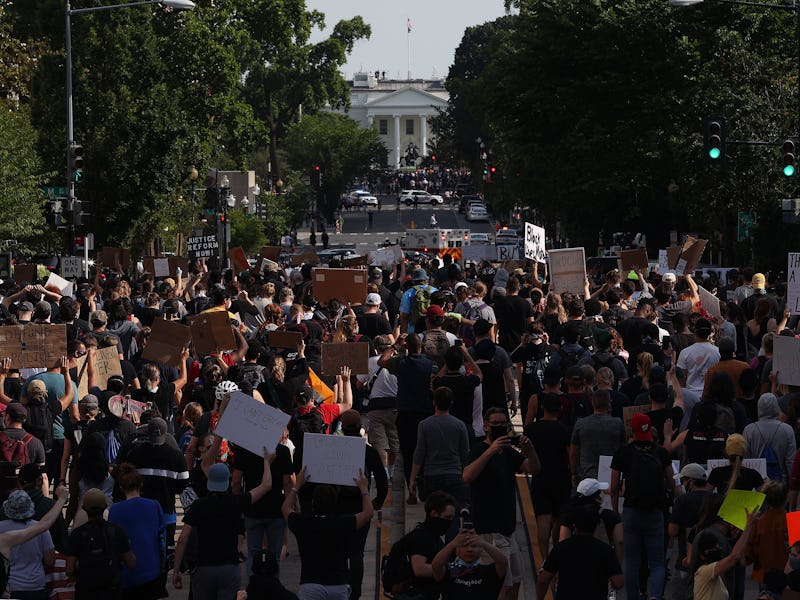5 tips for protesting during a pandemic
It's important to make your voice heard. It's equally important to make sure that you are safe and secure while doing so. Here are some tips that could help.

One-third of Americans say they've felt the need to protest in their lifetimes, and the death of George Floyd at the hands of Minneapolis police has only caused that number to increase.
If you’re going to a protest worth its salt, chances are you will encounter police there. And chances are that things could get out of hand.
With videos of police targeting protesters, media, and passers-by in recent days, it’s worth taking a few minutes to make sure that you’re safe, both from a digital and practical standpoint.
The ultimate phone security accessory.
5. Get a Faraday bag!
If you’re concerned about surveillance, your smartphone should be keeping you up at night. The apps you’ve downloaded, the unencrypted messages you’ve sent, the location sensor. All these things are useful for keeping tabs on you, and a Faraday bag can stop them all.
According to MOS Equipment, the California-based company that makes the bags, they can “block all wireless signals including WiFi (2.4 & 5GHz), Bluetooth, cell signals including 5G networks, GPS, RFID, NFC, and radio signals with 60dB-80dB average attenuation from low MHz to 5GHz spectrum.”
That’s a pretty tight ship, although it will also allow you to see your battery life.
They’re currently on backorder, but it’s worth getting to the front of the line now.
ProtonMail is as easy to use as other email clients, but far more secure.
4. Download Signal and ProtonMail!
To quote the Electronic Freedom Foundation: “No single messaging app can perfectly meet everyone’s security and communication needs, so we can’t make a recommendation without considering the details of a particular person’s or group’s situation.”
That being said, Signal’s as probably a good and safe choice as you can make for texting from either an Android or iPhone. And if you’re emailing about something you want to keep from prying eyes, try out ProtonMail, which also launched an encrypted calendar last year. Both have end-to-end encryption, which is crucially different from regular “encryption,” which many messaging apps now offer.
The difference, as explained by secure email client ProtonMail, is that “no one monitoring the network can see the content of your message — not hackers, not the government, and not even the company that facilitates your communication.
This differs from the encryption that most companies already use, which only protects the data in transit between your device and the company’s servers.”
Both Signal and ProtonMail have faced challenges from governments around the world. In America, new legislation with bipartisan support known as the EARN IT Act, threatens to place new standards on apps like Signal that the company calls overly burdensome, to the extent that it would have to shut down in the United States if passed. And earlier this year, ProtonMail was banned in Russia. Sadly, the resistance these apps are getting from world governments is a sign of their effectiveness.
Bad idea!
3. Leave your fancy headphones at home!
Protests get messy. One minute you’re marching, chanting, or taking a knee, and the next crowds are scattering and you’re separated from your group. Before you head out to a protest, it’s worth making a security plan for everything you’re bringing. Is it absolutely necessary? Would you miss what you’re bringing if it was lost? Are you prepared to carry it for five, ten miles? If not, leave it at home.
Bikes offer more flexibility, and are harder to track, than cars.
2. Walk or bike to the protests!
Cars have many advantages when it comes to transportation: they can take you anywhere with roads quickly and efficiently. But cars only work with roads. If you want maximum mobility, you’ve got to think smaller. Walking or biking can get you precisely where you want to be, without having to wade through traffic or having a valuable piece of property trashed.
There’s also the security aspect of things: as noted by the EFF, “Automated License Plate Reader Systems (ALPRs) automatically record the license plates of cars driving through an area, along with the exact time, date, and location they were encountered.
This technology is often used by law enforcement, or employed by private companies such as Vigilant and MVTrac who then share license plate data with law enforcement and other entities. Amassed in huge databases, this data is retained for an unknown period of time.”
So if privacy is a big concern of yours, keep the car at home. You’ll save on gas too.
Your body will remember. You should too.
1. Go to the bathroom beforehand!
Your body is just as much a machine as your phone or car. Just like they need charging or refills, your body needs to eat, drink, and relieve itself. It’s easy to forget about the essentials that your body needs to take care of itself, but think back to road trips you might have taken as a child, when a parent would ask several times, much to your annoyance, if you needed to go to the bathroom.
They were right then and they’re right now. Typically during protests, if a person needs to use the bathroom, they can find an open Starbucks or McDonald’s and hurry in and out before rejoining. The Covid-19 pandemic has shuttered most of these easy-access bathrooms, at least for the time being. So remember to keep your body comfortable: energy bars, stretching beforehand, remember your mask, walking shoes, water bottles, and going to the bathroom. Because that’s the last thing you’ll want to focus on at a time like this.
This article was originally published on